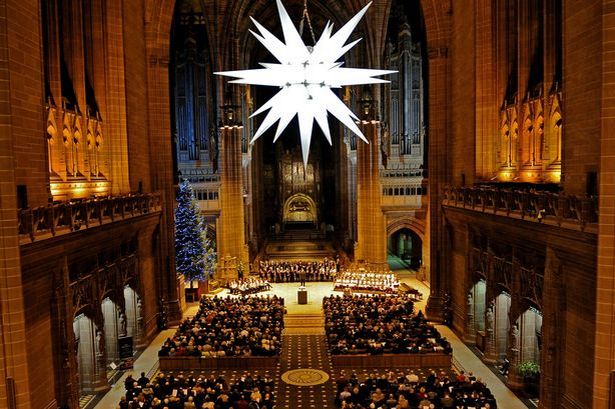Who is coming to our Christmas services and why? We might think this is obviously to encounter God. But some recent research shows 33% of participants did not believe in God. This should give us cause for thought, optimism and maybe action as we approach the Christmas season.
This summer I was able to get to the UK conference on implicit religion. There were many interesting papers and great people. The most impactful paper for me was about who was attending Christmas services at Cathedrals and why. There is a similar paper by the same team, including Prof. Leslie Francis, available to the everyone here . The paper was part of an investigation different modes of belonging to God – through Church, Events, Relationships, and Place. Fascinating and important research for those of us concerned with the future of religion.
Christmas in Liverpool
The paper looked at Christmas services at Liverpool Cathedral in 2019. One service was a “Holly Bough” service unique to the cathedral, the others were afternoon carol services. A total of 1700 people attended and responded to some in depth surveys at the three services. I have summarised some of the data that interested me below. Note – I have only included certain options from the original report and have combined data in some fields.

So let’s go through this data. First – the attenders where unlikely to be members or regular attenders at the cathedral. Between 2/3rds and 3/4 of the attenders were occasional visitors. This may be what you would expect or even hope for in a cathedral, or even at a local church, for Christmas service – lots of visitors. I do not have data on what the regular worshipper numbers for Liverpool cathedral would be. Interestingly, around 10% were visiting for the first time.
How did they come to be there? Many had been the previous year and almost equal numbers had been invited by a friend or had seen the service on the cathedral web site. The latter, by the way, means the person had been highly proactive in looking for somewhere to go – they had gone looking on the Cathedral web site, found an option they were interested in and had decided to attend.
But here is the bit that really got me. Around 80% of attenders described themselves as Christian – which means that around 20% did not describe themselves as Christian. From 1700 people that means around 340 people. But, very intriguingly, 64% of people said they believed in God – so 36% did not believe in God. 612 people, over 1/3 of the congregation, were at a Christmas service in 2019 but did not believe in God.
Challenge or opportunity?
The conclusions to the paper suggest that it has identified some opportunities which all churches might take to heart. Christmas is the time when “event belongers” will attend. We might also think of them as “CnE” Christians – Christmas and Easter – although Easter attendance itself in many areas is in significant decline. They are probably unconnected to local churches. They may not believe in God. Yet they come happily and willingly. What draws them may be the Christmas music, but this is a part of their Christmas celebrations, their Christmas ritual.
How did the people get to be in Church at Christmas? 25% of them were there because a friend invited them. Some research from the NCLS in Australia ( here ) re-enforces this. Apparently 45% of Australians would say yes to an invitation to a Christmas service. Only 25% would say no. People would even go just because the invitation came from someone they cared for like a friend or family member.
There is another perspective on this data however. These “event belongers” may be perfectly happy with their taste, their “amuse bouche”, of religion at this time of year. They may see no reason to be a part of a congregation outside of this time. They may be “Christmas-ians” rather than Christians, embracing the whole modern Christmas experience from Cathedral Carols, to Santa Claus, to Whamaggedon. We will never know what each persons response will be until we ask.
So we had better be ready to invite people to come to our services, and have a web site which easily and clearly gives the times of the services they might want to attend. And at those services we had better be ready to offer visitors an experience which will encourage them to come back again after the Christmas season.
This will be my last blog before the New Year so I wish you all a very joyful Christmas season. To those in ministry, may your Christmas be as stress-free as possible and may you find time to recover before the challenges of 2024. “God bless us all.”
Comment on this edition of NumbersMatters
by joining the “Church Statistics” Facebook group,
or by emailing me – nelliot(a)national.anglican.ca
